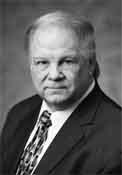 | John Eck
is the owner of the ECK Agency, Inc., which is an independent insurance agency representing over 80 companies offering life, health, property & casualty insurance. Beginning his career in 1968, he is a Certified Insurance Counselor, a licensed Kansas insurance broker, and has held numerous positions with other related business ventures. Currently an active member of his local School Board, he has also held elected positions on the City Council and Hospital Board in past years. John can be reached at his office by phone at (800) 444-4911, or you may e-mail him at: eck@eckagency.com |
Insurance
2001-07-01 16:07:00
Why isn’t health insurance good enough when it comes to cancer coverage?
Question: Recently, I've been hearing about people buying Cancer Insurance. I have health insurance through my work for my family. What does cancer insurance cover that is already not covered through health insurance?
Answer: First, both you and the company for which you work need to be commended for having health insurance. Unfortunately, many families today do not. Not knowing what health plan you have, I am assuming that the coverage provided is at least better than average. Your health plan (as with all health plans being offered today) has a provision in the policy or certificate entitled 'Exclusions'. You will find in checking various health insurance plans that these exclusions can range from ten to forty plus areas of non-coverage or very limited-coverage. Experimental treatments, consulting or using hospitals or doctors not on the company preferred list and even cosmetic procedures are included in most company's 'Exclusion' provisions.According to the American Cancer Society (Cancer Facts & Figures - 1998), men have a one in two lifetime risk of developing cancer; women have a one in three risk. Over two million new cases of cancer are expected to be diagnosed this year alone. Treatment of cancer is costly. Over $35 billion is spent each year to treat cancer. Additionally, it is estimated that over $65 billion is spent to pay for costs that not covered by insurance. These are only numbers, until you or a member of your family becomes a part of the statistics. Your health insurance should pay for most of the chemotherapy, radiation, surgery, consultations, x-ray testing and scans, and other hospital and clinic charges. Of course, you have to pay the deductible, co-pays and other cost sharing amounts imposed by the policy. These non-covered items are only the beginning of the 'extra expenses' however. Cancer is a very 'special' type of illness. Although the survival rate for cancer has increased dramatically over the last few decades due to newer treatments and medical advances, there is an indescribable fear associated with the diagnosis. In addition to not knowing what is the very best treatment available, one does not know who is the best doctor/oncologist, where the best treatment center is, or even where to go for such information. Another stressful unknown is how much it will all cost, especially since you want the best. Good and better' isn't enough... after all, this has got to be fixed. In addition to the non-covered expenses, the regular bills still come in each month. The mortgage, car payment, utilities, groceries and other family expenses still require a regular paycheck. Will you still be able to continue working? There are many additional expenses that now must be budgeted for and paid which result from the diagnosis. In order to satisfy oneself that the 'best' treatment is going to be available, travel, lodging, phone calls, and additional household help is needed. The expenses associated with trips to the doctor, Anderson, Mayo Clinic, Memorial Sloan-Kettering Cancer Center, and other national treatment centers can take away a lot of savings. Supplemental cancer insurance provides the extra cash to allow all the new bills to be paid and to reduce and eliminate the stress associated with the reduced paychecks. An important item to understand is that all benefits paid under this supplemental insurance are paid in addition to any other individual or group health insurance you already have. Those who have battled cancer without the benefit of extra cash provided by supplemental insurance will tell you of the added stress, pain, and worry. Supplemental cancer insurance protection doesn't pay the hospitals, doctors, or radiologists. It pays you direct. You receive additional money based on the type of care and treatment needed, sort of like a disability insurance payment. The money paid directly to you can be used by you in whatever way you need it. There are policies that pay as little as $50 per day when receiving chemotherapy or radiation treatment, as well as policies which pay additional moneys to the patient equal to the total amount of actual charges billed for the treatment, which can be thousands of dollars per day.Question: How do I determine which is the best policy?Answer: Review the benefits of each prospective policy to determine which will pay you the most cash for major expenses caused by the illness. Since chemotherapy and radiation are usually the most significant and expensive treatments, look closely at the benefits paid for these treatments. Disregard such terms as 'unlimited' since many policies have other limiting features which may reduce the total benefits paid.Question: Is Cancer Insurance expensive?Answer: Perhaps the best way to answer this question is by comparing it to some other forms of coverage. Dental insurance is somewhat popular and considered a necessity by many people. A family dental policy costs around $65 per month. Generally the benefits are limited to $1000 - $1500 per year. Almost everyone on Medicare pays for a supplement policy with a cost of $65 to $200+ per month, which too, has very limited benefits. An excellent supplemental cancer policy costs a family between $40 and $65 per month and can pay hundreds of thousands of dollars per year


